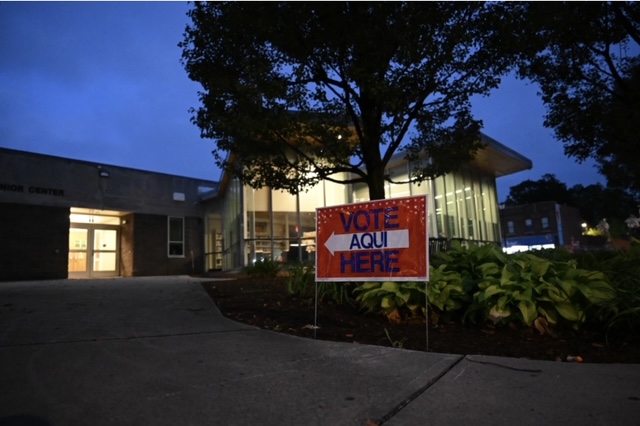Latinos continue to have a growing influence on the electorate nationally and in Connecticut. As the November election approaches several Connecticut Latinos shared their current thoughts and feelings on the election.
The economy
Economic issues, particularly inflation, were voiced as a source of frustration by several Latino voters.
“When it comes to the economy, I think we’re all feeling it,” said Liz Sandra, a Hartford resident with Puerto Rican heritage. “It’s so hard to exist right now. And I think as millennials, we’ve been working our whole lives, and we have nothing to show for it. We have nothing to represent us at the top, and we can’t even buy houses now because it’s so expensive.”
Douglas Ayala, a Connecticut resident of Salvadorian descent, agreed.
“The economy’s not doing that well,” Ayala said. “Everything’s getting expensive. Even though you can earn a lot working long hours, the minimum wage is around $16 per hour, and it doesn’t go far enough. Prices keep going up.”
Fanny Puertas, a Peruvian business owner, also said she’s been impacted by inflation.
“Food prices have increased so much that I have had to raise the prices of the dishes I sell. This has led to a decrease in customers, and I have had to lay off staff,” Puertas said.
Political disconnect
While the economy was a central issue to some of the people who were interviewed, Sandra, the Hartford resident, said there’s also a disconnection with the major political parties.
“Both candidates are older and do not represent me or anyone like me,” Sandra said. “It feels like our choices were taken from us, and it’s frustrating to be forced into voting for candidates that don’t resonate with us.”
Sam Grados, of Puerto Rican heritage, said the generational gap in leadership is a real concern.
“Different generations see things differently,” Grados said. “It would be nice to have someone younger running for presidency.”
Puertas took an even more skeptical stance.
“I don’t feel identified with either of them,” Puertas said. “I don’t believe in politics. I always believe in my work and try to see the opportunities to move forward.”
Conflict
Political engagement is also facing challenges from younger Latino voters due to the current Israel-Hamas war.
“I’m not excited about the upcoming election,” Sandra said. “Given what’s going on in the Middle East and Biden’s stance, I’m not sure I even want to vote this year. The vote I cast last term elected the president we have now, and I feel disillusioned.”
Puertas said that “war is a setback for the world in every sense of the word. I don’t agree with it.”
Immigration
Nationally, Latinos see the current state of the U.S. southern border as a major problem.
In Connecticut, Ayala, whose parents are from Central America, acknowledges the challenges for immigration. “The U.S. wasn’t prepared, and it created more problems.”
As an immigrant herself, Puertas has a critical view of current immigration policies.
“I believe that politicians promise a lot during their campaigns, but rarely deliver. Unregulated immigration has harmed many people already living here,” Puertas said. She also believes that the influx of immigrants has created insecurity and social justice issues in the community.
“Our country was built on the backs of immigrants,” Sandra said. “ We need reform to process people who want to come here better. Sending them back isn’t fair, especially when our parents came here to build better lives. Immigrants want to work hard and succeed, pursuing the American dream.”
Not a monolith
While there were a number of shared concerns and perspectives among those interviewed, no community has a uniform experience or perspective.
Professor Charles Venator, interim director of the El Instituto: Institute of Latina/o, Caribbean, and Latin American Studies, pointed to differences within Connecticut’s diversifying Latino community. In Connecticut, Puerto Ricans and Latinos make up 18% of the population, including citizens, children and non-citizens. Venator said naturalized Latinos in Connecticut show increased voter participation and improved socio-economic conditions compared to Connecticut Latinos with Puerto Rican heritage.
Venator said a significant challenge to political representation in Connecticut for Latinos is that many recent arrivals register as independents, excluding them from conventions and primaries, which in turn gives them less influence over candidate selection.
“This leads to candidates not representing many Puerto Rican and Latino interests,” Venator explained. Despite this, most Puerto Rican and Latinos lean towards the Democratic Party.
Venator’s research also reveals that Latina single mothers, or heads of households, in Connecticut often face significant inequalities, and often feel their interests and experience are not represented by many of the leading candidates.
Latinos in Connecticut face two main issues, Venator said: many are not citizens and can’t vote and a significant portion of the population is still too young to vote. In Connecticut, only 13% of the Latino population votes, he said.
Learn more
Other community members shared their perspective on the upcoming election in a Connecticut Public Wheelhouse episode: Focusing on Latino communities — and not on whether they’re for Biden or Trump.
Editor’s Note: This story was published before President Joe Biden dropped out of the presidential race and Vice President Kamala Harris was named the Democratic part nominee.
Some Connecticut Latinos share nuanced and surprising views on the upcoming November election was originally published by CT Public, and republished with permission.
Part of LNN’s mission is to amplify the work of others in providing greater visibility and voice to Hispanic, Latino communities.
